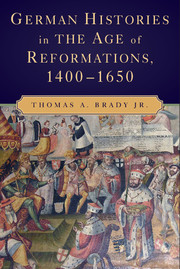Book contents
- Frontmatter
- Contents
- Figures, Maps, and Tables
- Acknowledgments
- A Note on Usages
- Map 1 The Empire in 1547
- Map 2 The Peace of Westphalia, 1648
- Part I The Empire, the German Lands, and Their Peoples
- Part II Reform of the Empire and the Church, 1400–1520
- Part III Church, Reformations, and Empire, 1520–1576
- 9 Urban Reformations
- 10 A Revolution of the Common Man
- 11 Imperial Reformations in the Age of Charles V
- 12 Imperial Peace, 1555–1580
- Part IV Confessions, Empire, and War, 1576–1650
- Appendix
- Glossary
- Bibliography
- Index
11 - Imperial Reformations in the Age of Charles V
Published online by Cambridge University Press: 05 June 2012
- Frontmatter
- Contents
- Figures, Maps, and Tables
- Acknowledgments
- A Note on Usages
- Map 1 The Empire in 1547
- Map 2 The Peace of Westphalia, 1648
- Part I The Empire, the German Lands, and Their Peoples
- Part II Reform of the Empire and the Church, 1400–1520
- Part III Church, Reformations, and Empire, 1520–1576
- 9 Urban Reformations
- 10 A Revolution of the Common Man
- 11 Imperial Reformations in the Age of Charles V
- 12 Imperial Peace, 1555–1580
- Part IV Confessions, Empire, and War, 1576–1650
- Appendix
- Glossary
- Bibliography
- Index
Summary
Every human benefit, every virtue and every prudent act, is founded on compromise.
Edmund BurkeA prophesied age of peace and unity arrived in 1519 with the election of Spain's young king to the Imperial throne. The Archangel Michael himself, the author of “The Book of the Hundred Chapters, ” had announced, “proposes … to reestablish a firm Christian faith on earth, so that the words of our Savior may be fulfilled: ‘There shall be one flock, one shepherd.’” [John 10:16] When news of Charles's election at Frankfurt came to the royal court in Spain, Grand-Chancellor Mercurino Arborio di Gattinara (1465–1530) announced that the work begun by Charles the Great (Charlemagne) would be completed by Charles the Greatest, who would give the world one pastor and one flock.
Every sun shone on fortune's darling. Brightest of all glowed the great golden disk of Moctezuma II (ca. 1466–1520), sent to the king by Hernán Cortés (1485–1547) from the sack of Tenochtitlán. Albrecht Dürer viewed this wonder at Antwerp in 1520: “I also saw the things sent to the king from the new, golden land, a sun entirely of gold a klafter wide, a silver moon just as wide.” “In all my life,” he marveled, “I have seen nothing that so gladdened my heart as these things, for I saw there wondrous works of art and marveled at the subtle skills of those men in foreign lands.
- Type
- Chapter
- Information
- German Histories in the Age of Reformations, 1400–1650 , pp. 207 - 228Publisher: Cambridge University PressPrint publication year: 2009
- 1
- Cited by

